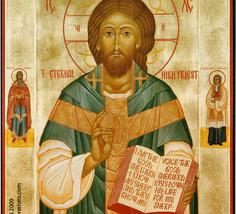THE NEW CREATION
FROM ST. PAUL'S WRITINGS
A circle represents perfection. That is how God created everything that He made. That included of course mankind. We had the opportunity to live in the state of perfection and in communion with God.
What theologically we know as The Fall, is man tempted to be like God in wanting to know both good and evil when he disobeyed God’s command. We know the result – being cast out of the garden of paradise and having to labour and sweat to live. Through his sin of disobedience, not only humans but also creation has groaned.
Such is God’s love and mercy that He began the process of reconciliation, firstly in His covenant with His chosen race, secondly through His prophets and finally by sending the eternal Son into His world. By living in complete obedience to the will of the Father, an obedience that brought Him to the cross and then by His resurrection and ascension has reconciled mankind to God and the surety of eternal life. The circle has now been redrawn.
We are now living in the new creation that means that the living Christ lives within each of us through the Holy Spirit. I think so many Christians overlook or even neglect God living within us. So often we think of God out there, almost absent from our everyday life. It is a shame that we do not know Paul very well, especially his theology. As the noted biblical scholar, Raymond Brown, once remarked at a workshop he was given for priests, “I have never heard a sermon on Romans, that letter that shaped so many of the great theologians of the church such as Augustine, Luther and Bart.” And I agree. So what did Paul teach us?
He is very definite that “if anyone is in Christ, he/she is a new creation; the old has passed away, behold, the new has come” as he informed the Corinthians (2 Cor. 5:17). Later on in Romans Paul elucidated:
For the creation waits with eager longing for the revealing of the sons of God; for the creation was subjected to futility, not of its own will but by the will of him who subjected it in hope; because the creation itself will be set free from its bondage to decay and obtain the glorious liberty of the children of God. We know that the whole creation has been groaning in travail together until now; and not only the creation, but we ourselves (Rom 8:19–23).
Paul made it clear we are now free of the old shakels. The old way of sin has passed away, that is, has been nailed to the cross with Christ and then buried with Him. We were formerly slaves to sin but now no longer. There is no excuse for anyone not to rejoice as a member of the new creation thanks to Christ now sitting on the right hand of God the Father. Theologically this is our regeneration, a new birth, “created to be like God in true righteousness and holiness” (Ephesians 4:24).
The early Fathers taught of the significance of the eighth day of creation. Originally, God’s creation was perfect as illustrated. As the first century epistle of Barnabas expressed it, “God set all things at rest” But man did not rest but disobeyed. However “with the new dawn” God will “usher in the Eighth Day, the beginning of a new world.” That is how God intended His creation. The eighth day is also a time of rejoicing for it is the day that Jesus rose from the dead and ascended to His Father in heaven (Ep. Barn. 15:8b).
Of course, this author and other early Fathers were enforcing Paul’s teaching that in Christ’s resurrection the old has passed away and the new has come. The Resurrection- Ascension restored the fallen creation. We all live now united in Christ in this new creation or should.
There is no doubt that Paul was inspired to teach the “new creation in Christ” through his own experience of the Ascended Lord. When one is confronted by the Cosmic Lord it means that life is changed completely forever – a new life emerges. As he would inform the Galatians:
I have been crucified with Christ, and it is no longer I who live, but Christ lives in me. So the life I now live in the body, I live because of the faithfulness of the Son of God, who loved me and gave himself for me (Gal. 2.20).
When one understands Paul rather than seeing him, as some do, as a misogynist, probably not from his pen, one discovers the real Paul as a great mystic. He “understood universal reality, a cosmic notion” of human beings as an integral part of this creation. Paul comprehended that the risen-ascended Christ is the pivot of all creation in which we are grafted through Him. “In Christ” is an expression he used over and over again. When Paul uses this phrase "in Christ" it specifically refers to the risen and glorified Christ. Never in his authentic letters does he use the expression “in Jesus” because for him this refers to the historical person with its limitation of time and place. The phrase “in Christ” automatically refers to a person not limited by time and space, a relationship to the ever-living Christ, Lord of the cosmos.
To emphasise this new life “in Christ” Paul in his writings contrasts the first Adam with the second. The first we know was created as a “living soul” with the potential for everlasting life. But Adam botched that. In doing so, he isolated himself from his maker and became his enemy. In that deep-thought out theological letter, Romans, Paul wrote:
Yet death reigned from Adam to Moses, even over those whose sins were not like the transgression of Adam, who was a type of the one who was to come. But the free gift is not like the trespass. For if many died through one man's trespass, much more have the grace of God and the free gift in the grace of that one man Jesus Christ abounded for many. And the free gift is not like the effect of that one man's sin. For the judgment following one trespass brought condemnation, but the free gift following many trespasses brings justification. If, because of one man's trespass, death reigned through that one man, much more will those who receive the abundance of grace and the free gift of righteousness reign in life through the one man Jesus Christ. Then as one man's trespass led to condemnation for all men, so one man's act of righteousness leads to acquittal and life for all men. For as by one man's disobedience many were made sinners, so by one man's obedience many will be made righteous … so that, as sin reigned in death, grace also might reign through righteousness to eternal life through Jesus Christ our Lord. (5:14-19, 21).
That is an amazing reflection. Why would one want to live like the first Adam, trapped in the life of sin when the second Adam, the glorified Christ, has delivered us from that life with His gift of grace. Thus, none have to live and groan anymore in the old creation.
The other famous Pauline passage juxtaposing the two Adams is in his first letter to the Corinthians to teach that even the result of, sin, death has been overcome in the second Adam.
For as by a man came death, by a man has come also the resurrection of the dead.
For as in Adam all die, so also in Christ shall all be made alive (I Cor. 15:21-22).
Or as the Orthodox Paschal troparion states:
Christ is risen from the dead,
Trampling down death by death,
And upon those in the tombs
Bestowing life!
It is so important for us to understand that Christ came to restore the divine, spiritual life lost by the first Adam. He also came to restore truly human life to the body as well. Writing of the resurrection of the body at the end of time St. Paul proclaims, "It is sown corruptible; it is raised incorruptible. It is sown dishonourable; it is raised glorious. It is sown weak; it is raised powerful. It is sown a natural body; it is raised a spiritual (a Spirit-filled) body" (1 Cor.15:42-44). So even after physical death we live with Christ for ever in the general resurrection.
Paul also taught us we become a participant of that new creation when we are baptised. Again, in Romans he explained:
Know you not, that so many of us as were baptized into Christ Jesus, were baptised into his death?
Therefore we are buried with him by baptism into death: that like as Christ was raised up from the death by the glory of the Father even so we also should walk in newness of life. … (Rom. 6:3–4).
Yes, the baptised become a new creation in Christ. The Spirit that we receive bears “witness with our spirit that we are the children of God. And if children, then heirs; heirs of God, and joint-heirs with Christ; if so be that we suffer with him, that we may be also glorified together” (Rom. 8. 16–17).
As Paul knew that the glorified Christ lives within, he also taught us we are indeed the “new temple” or even the second temple. In the first temple the shekinah, that is, the glory of God, dwelt (1 Kgs. 8:10) but previously also in the tabernacle (Ex. 40: 34). Ezekiel spoke of the glory of God leaving the first temple (Ez. 10:19) but it would return through the east gate (Ez.43: 2–4) It was never fulfilled because of Israel’s unfaithfulness until Christ. This meant as we live in Christ, God’s glory is in the baptised. As Paul wrote to the Corinthians:
Do you not know that you are God's temple and that God's Spirit dwells in you? If anyone destroys God's temple, God will destroy him. For God's temple is holy, and that temple you are (1 Cor. 3. 16-7).
Paul is cautioning the baptised who were previously pagans that they cannot abuse their bodies anymore morally or physically. Their and our conduct must reveal that they/we have been born again in “the spirit of God”. After all, “the Spirit searches everything, even the deep thoughts of God” (1 Cor. 2: 10–11). We can never forget that God dwells within us. We also must know that it is His Spirit that gives a unity of flesh and spirit in which the spiritual is the reality just as it is in the world.
To enable us to live in this new creation the Spirit has given us gifts. As Paul wrote to the Corinthians:
That same living Spirit has given us gifts to manifest in our lives of how we now live as part of that new creation in Christ (1Cor.2:12).
What are these gifts? Paul named them in his letter to the Galatians:
The fruit of the Spirit is love, joy, peace, patience, kindness, goodness, faithfulness, gentleness, self-control; against such there is no law. … If we live by the Spirit, let us also walk by the Spirit (Gal. 5.22—23, 25).
What a wonderful passage on which to ponder often. We must remember that they are gifts, given to us by God to enable us to live in this new creation. They are not what we achieve through our endeavours.
Love – It is only God who can make us love, even those we find the hardest to love in our lives. If we find this extremely hard, we must pray for more grace and to remember that God came to make the loveless, lovely just as He is doing with us. The English mystic, Walter Hilton, insisted that the “gift of divine love makes perfect peace between God and a soul, and unites all blessed creatures wholly in God.”
Joy – When we acknowledge this gift within, it should glow and be infectious. If we find it hard to be joyful, let us remind ourselves that we live in the eternal presence of God, even when our lives face sadness or hardship. There is no such thing as a gloomy Christian.
Peace - the Hebrew word, Shalom, extends more than being free from scorpions but a well being of soul as well as body. It will keep our hearts and minds in the knowledge and love of God as Paul taught us. This is the peace that Christ promised before His death. “My peace I give unto you, my peace I leave to you, not as the world giveth, give I unto you” (Jn. 14:27).
Patience – is certainly a God given gift. Like love, in human terms sometimes it is hard. So much harm and mischief are done when we are quick and hot tempered. As a child, I was taught to count to ten when I wanted to strike out, but now I pray that God will temper me with tranquillity that will help me being patient when it is hard.
Goodness - is something that belongs to God solely, but when the Holy Spirit is acting in us as He should, then our lives display God’s goodness, not our own. That is why people are wrong not only grammatically but also theologically when they say “I am good”.
Of course if they continued, “because God lives within me”, that would be correct or almost.
Faithfulness – this gift enables us to put up with so much in life. It also enables to continue when God seems not to be present. It is an endearing virtue. When we have this gift together with humility it is a great asset to patience and accepting of things that we cannot change.
Self-control is the twin to patience and is another word for disciplining our lives and our feelings.
Everybody is given these gifts through the Spirit; it is up to us to use them and be thankful for them.
Within this new creation, Paul also taught us that the Spirit bestowed different gifts to different persons. In 1 Corinthians Ch.12 he outlined these.
The first is the gift of wisdom – that gift that Solomon had sought as a young king. It is to discern right from wrong, goodness from evil, truth from falsity.
The second is knowledge - the most important knowledge is to know the risen and ascended Christ who lives within us through the Spirit.
The third is faith – that we have already covered, a belief that will help us move mountains.
The fourth is healing – the ministry of laying hands on the sick and also in visiting and parying with them.
The fifth is working miracles – ask anything in my name believing and it will be granted.
The sixth is the gift of prophecy – the ability to speak with God’s thoughts and to teach.
The seventh is discerning of spirits – the gift to interpret.
The eighth is to speak in tongues – the gift to pray and speak in what seems an unintelligible language to others.
The ninth is to interpret the speaking in tongues – apparently not everyone who spoke in tongues knew what they were saying. I don’t think Paul thought too highly of this gift but there it is.
Paul insisted these gifts are given to individuals to use for the benefit of the community he/she lives. What gift or gifts do you think you have to offer your community?
When we ponder on the gifts God gives us, I am also mindful of what Paul taught us about prayer as a gift in this new creation. It is the Spirit who prays within us. Paul knew only too well from his own life that it is “the Spirit [that] helps us in our weakness, for we do not know how to pray as we ought, but that very Spirit intercedes with sighs too deep for words” (Rom. 8. 26).
We may sometimes think it is we who are praying, but if it is effective praying it will be from the Spirit that prods within. So perhaps if our prayers do not seem to be answered we should first examine the praying. Sometimes we find ourselves in tune with prayer but we falter; we cannot find the right word to express what we want the Father to hear. It is at those times we should call to mind Paul’s encouraging words that the Spirit groans within us, reaching out and articulating what our intentions are. We just have to be patient. As Paul conveyed to Christians in Rome, “Rejoice in hope, be patient in suffering, persevere in prayer” (Rom. 12.12).
All kinds of prayer come from the Spirit as illustrated in Paul’s letters. He told us:
Firstly, to rejoice and be happy that as Christians we know the Lord. “Rejoice in the Lord always and again I say rejoice” (4:4).Those words to the Philippians were at the heart of Paul’s understanding of prayer and it should be of ours too.
Secondly, thanksgiving as seen in Paul’s example “I thank my God always on your behalf for the grace of God which is given to you in Jesus Christ” (1 Cor. 1:4).
Thirdly, Paul taught the importance of intercessory prayer. In his case, it was for the various Christian communities, as expressed in his letter to the Romans – a community he hoped to visit. Paul also interceded for those fledging Christians to live not only prayerful lives but also to keep their bodies as a temple worthy of the Holy Spirit. Paul prayed that the Lord keep their bodies as “a living sacrifice, holy, acceptable unto God” (Rom. 12. 1.). He encouraged those early converts to pray also for him and his work:
I beseech you my brothers and sisters, for the love of Jesus Christ, and for the love of the Holy Spirit, that you strive together with me in prayers to God for me (Rom. 15:30).
Sometimes his request was very simple – e.g. brothers and sisters pray for us (I Thess. 5. 25).
`Praying also had its mystical component for Paul; that aspect of prayer that we associate with the desert Fathers and Mothers and those like Paul who have been caught up to heaven by waiting upon Him. In 2 Cor. 12: 2-4, Paul spoke of such an experience:
I know a person in Christ who fourteen years ago was caught up to the third heaven – whether in the body or out of it I know not; God knows. And I know that such a person – whether in the body or out of the body I do not know; God knows – was caught up in paradise and heard things that are not to be told, that no mortal is permitted to repeat.
That aspect of prayer is generally referred to as contemplation. Yes, in the new creation Christ’s living Spirit dwells within each of the baptised but for this to be active we have to nourish Him/Her. The Desert Fathers and Mothers discovered this by going inwards into the heart and being conscious of that presence. Later on, in the Orthodox tradition hesychasts often meditated on the Jesus Prayer. This involves repeating the name of Jesus over and over again.
The English mystic, Rolle, of the 14thC. in giving counsel to a woman advised her to pray:
May [I] love your name Jesus, and meditate on it in my heart, so that I may never forget it wherever I am. I shall find great joy and strength in Your name, Lord Jesus, and because I love You so tenderly, and as such an intimate friend, You will fill me with grace on this earth.
To be alive truly in the new creation, we must consciously live with Christ Jesus not only on our tongue but in our heart and mind, in activity and quietness, awake and sleeping. Furthermore, the great Paul would say even this way is not profitable without manifesting love to God and to our fellow human beings. Love is the corner-stone to our existence. It is love that brought us into the new creation so that we shall never taste of death but live continually in the eternal presence of our loving God.



